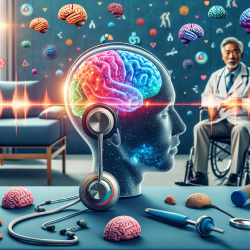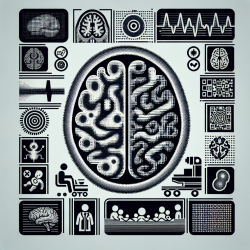The complexity and impact of traumatic brain injuries (TBIs) on patients' lives cannot be overstated. With TBIs affecting approximately 700,000 Americans annually, the need for comprehensive rehabilitation strategies is critical. A cornerstone of effective rehabilitation is the collaboration between various healthcare professionals, including audiologists and speech-language pathologists. A pivotal study, "Audiologic Assessment of Traumatic Head Injury Patients in Rehabilitation: Methods and Findings," by Daniel P. Harris and James W. Hall III, sheds light on the significance of audiologic evaluations in the rehabilitation process of TBI patients.
This research underscores the prevalence of auditory dysfunctions in TBI patients and the necessity of detailed audiologic evaluations to tailor effective rehabilitation programs. The study analyzed audiologic test results for 60 head injury patients, revealing that a substantial number of these individuals demonstrated abnormalities in central auditory processing and auditory evoked responses, more so than in hearing sensitivity and speech discrimination.
Key Findings:
- Over 50% of the patients exhibited central auditory processing problems.
- Electrophysiologic methods, such as immittance audiometry and auditory evoked responses, were essential in evaluating even those in comatose or confused states, as these tests do not require active participation from the patient.
- Behavioral audiometry, assessing hearing sensitivity and speech discrimination, depended on the patient's ability to follow instructions and respond, highlighting the need for comprehensive assessments beyond simple screenings.
- A significant pattern emerged showing a pronounced reduction in left ear performance, suggesting that the diffuse neural lesions associated with closed head trauma may lead to inefficient auditory processing mechanisms.
The implications of these findings for rehabilitation are profound. Firstly, they emphasize the need for a highly controlled auditory environment in both formal therapies and the patient's living situation. The nature and amount of auditory input must be individually structured to match the patient's auditory processing capabilities. Additionally, these insights highlight the necessity of considering the patient's auditory abilities in group therapy settings, where individual attention may be required to manage communicative demands effectively.
The study also advocates for the close cooperation between speech and hearing professionals to maximize the treatment outcomes for TBI patients. This interdisciplinary approach can significantly enhance the quality of rehabilitation, offering a more holistic and effective treatment plan that addresses the multifaceted needs of TBI patients.
For practitioners working with TBI patients, this research underscores the importance of incorporating detailed audiologic assessments into the rehabilitation process. By doing so, therapists can develop more targeted and effective treatment plans that address the specific needs of each patient. Furthermore, this study serves as a call to action for practitioners to engage in further research and continuing education to deepen their understanding of the complexities of TBI rehabilitation.
In conclusion, the study "Audiologic Assessment of Traumatic Head Injury Patients in Rehabilitation: Methods and Findings" provides invaluable insights into the critical role of audiologic evaluations in the rehabilitation of TBI patients. It highlights the need for a multidisciplinary approach to therapy, emphasizing the importance of addressing auditory dysfunctions to enhance rehabilitation outcomes. As practitioners, embracing these findings and incorporating them into our practices can significantly impact the lives of those recovering from TBIs.
For those interested in delving deeper into the study and its methodologies, Audiologic Assessment of Traumatic Head Injury Patients in Rehabilitation: Methods and Findings is a must-read.










